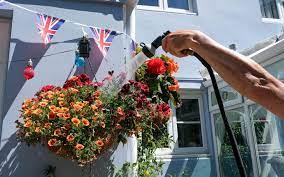A water company boss blames people working from home for the first hosepipe ban of summer which will hit households in Kent and Sussex. South East Water is imposing restrictions on Monday after customers faced supply problems earlier this month.
It comes after it emerged remuneration packages for water industry bosses soared last year, despite hundreds of thousands of sewage spills.

1. Increased demand
The hot weather is making many of us thirstier than usual, but it’s also pushing some water reserves to the limit. This has led to a series of bans across the UK.
South East Water imposed the first temporary hosepipe ban of the summer on Monday, affecting households in Kent and Sussex. It said demand for water had risen 20% over the past four weeks, which has put pressure on existing infrastructure. The company blamed low rainfall since April and the hot weather.
It also said that more people working from home during the Covid-19 pandemic had caused a “reduction in the time spent on essential chores” such as watering gardens and filling paddling pools. It said that anyone who defied the ban could face a PS1,000 fine.
But other water companies have not imposed a ban and some are even proud of the fact they’ve never enforced one. For example, Northumbrian Water, which supplies Portsmouth, says it does not anticipate a ban and Essex and Suffolk’s owners, Northumbrian Water Group, say they are not expecting restrictions either.
2. Low rainfall
With the UK experiencing one of the hottest summers on record, the water supply has come under pressure. It’s a fact that some water companies are limiting usage to help maintain reservoir levels.
Some have even imposed regional bans on people using hosepipes.
This has left water reserves dwindling.
While hosepipe bans are not something anyone wants, they play an important role in maintaining the water supply during a drought period. They help to reduce demand on the system and limit waste – such as watering your garden or filling a paddling pool. During a hosepipe ban, homeowners can still carry out these tasks, but must do so with a bucket or a watering can instead of using a hose.
3. Hot weather
This can include garden watering, washing cars, and refilling ponds.
South East Water is imposing its first hosepipe ban of the summer, impacting two million homes and businesses across Kent and Sussex. The company isn’t blaming work from home, but says temperatures have caused drinking water demand to hit “record levels”.
While most groundwater supplies remain in good health, there are concerns about a lack of rainfall for the next few weeks. The Met Office has forecast temperatures to reach the high 30s in some areas, and there’s no significant rain on the horizon to replenish reservoirs and rivers. That means water companies will need to manage their supplies carefully. Keep an eye on our hosepipe bans page for updates.
4. More people working from home
A hosepipe ban means people cannot use their mains water to fill a paddling pool or swimming pool, maintain an ornamental pond, wash vehicles, or clean driveways.
The Covid pandemic has led more employers to allow employees to work from home, allowing them to avoid the commute and stay close to home. And the rise of remote work is affecting the way water companies are managing their supplies.
South East Water will impose its first summer hosepipe ban from Monday, which will affect more than two million households across Kent and Sussex. Its chief executive has blamed more people working from home post-pandemic as a key reason for the restriction.
The company offers a variety of products and services, including life insurance, property and casualty insurance, and retirement planning needs read more hear.



















